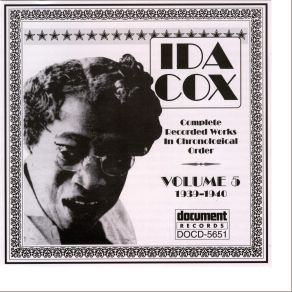Ida Cox Vol. 5 (1939-1940)
Download links and information about Ida Cox Vol. 5 (1939-1940) by Ida Cox. This album was released in 2000 and it belongs to Blues, Jazz genres. It contains 19 tracks with total duration of 56:15 minutes.

|
|
|---|---|
| Artist: | Ida Cox |
| Release date: | 2000 |
| Genre: | Blues, Jazz |
| Tracks: | 19 |
| Duration: | 56:15 |
| Buy it NOW at: | |
| Buy on iTunes $9.99 | |
| Buy on Amazon $8.99 | |
Tracks
[Edit]| No. | Title | Length |
|---|---|---|
| 1. | Deep Sea Blues (Take 1) | 3:20 |
| 2. | Deep Sea Blues (Take 2) | 3:24 |
| 3. | Death Letter Blues (Take 1) | 3:17 |
| 4. | Death Letter Blues (Take 4) | 2:46 |
| 5. | One Hour Mama (Take 4) | 2:56 |
| 6. | One Hour Mama (Breakdown) (Take 5) | 0:17 |
| 7. | One Hour Mama (Take 6) | 3:07 |
| 8. | Four Day Creep | 3:28 |
| 9. | Pink Slip Blues | 3:01 |
| 10. | Hard Times Blues | 3:00 |
| 11. | Take Him Off My Mind | 3:05 |
| 12. | Last Mile Blues (Take 1) | 3:12 |
| 13. | Last Mile Blues (Take 2) | 3:19 |
| 14. | I Ain't Gonna Let Nobody Break My Heart | 3:21 |
| 15. | I Can't Quit That Man (Take 1) | 2:55 |
| 16. | I Can't Quit That Man (Take 2) | 3:00 |
| 17. | I Can't Quit That Man (Take 3) | 3:17 |
| 18. | You Got to Swing and Sway (Take 1) | 2:57 |
| 19. | You Got to Swing and Sway (Take 2) | 2:33 |
Details
[Edit]Other than an album from 1961, this CD has blues singer Ida Cox's final recordings. The first seven selections (which include a previously unreleased "One Hour Mama") has four additional alternate takes. Cox is heard in 1939 backed by an accurately-titled "all-star band" that consists of trumpeter Hot Lips Page, trombonist J.C. Higginbotham, clarinetist Edmond Hall, either James P. Johnson or Fletcher Henderson on piano, guitarist Charlie Christian, bassist Artie Bernstein and Lionel Hampton on drums. Although her prime was considered the 1920s, Ida Cox on "Death Letter Blues" and "Four Day Creep" still sounds pretty strong. The remainder of this CD is taken from a 1940 session with trumpeter Red Allen, Higginbotham, Hall, pianist Cliff Jackson, bassist Billy Taylor, and drummer Jimmy Hoskins that resulted in four titles and four alternate takes; only two performances were released previously, but Cox's singing is excellent. It is a pity that because musical styles had changed, Ida Cox was largely forgotten during this period.